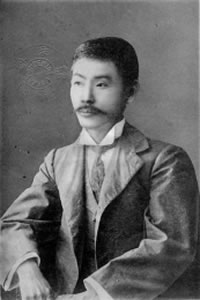De Iers-Britse schrijfster en filosofe Iris Murdoch werd geboren in Dublin op 15 juli 1919. Zie ook alle tags voor Iris Murdoch op dit blog.
Uit: The Black Prince
“It might be most dramatically effective to begin the tale at the moment when Arnold Baffin rang me up and said, ‘Bradley, could you come round here please, I think that I have just killed my wife.’ A deeper pattern however suggests Francis Marloe as the first speaker, the page or house-maid (these images would appeal to him) who, some half an hour before Arnold’s momentous telephone call, initiates the action. For the news which Francis brought me forms the frame, or counterpoint, or outward packaging of what happened then and later in the drama of Arnold Baffin. There are indeed many places where I could start. I might start with Rachel’s tears, or Priscilla’s. There is much shedding of tears in this story. In a complex explanation any order may seem arbitrary. Where after all does anything begin? That three of the four starting points I have mentioned were causally independent of each other suggests speculations, doubtless of the most irrational kind, upon the mystery of human fate.
As I have explained, I was about to leave London. It was a raw damp cold afternoon in May. The wind carried no flowery smells, but rather laid a moist healthless humour upon the flesh which it then attempted to flay. I had my suitcases ready and was about to telephone for a taxi, had in fact already lifted the phone, when I experienced that nervous urge to delay departure, to sit down and reflect, which I am told the Russians have elevated into a ritual. I replaced the instrument and went back into my crowdedlittle Victorian sitting-room and sat down. The result of this manoeuvre was that I was immediately aching with anxiety about a number of arrangements which I had already checked ten times over. Had I got enough sleeping pills? Had I packed the belladonna mixture? Had I packed my notebooks? I can only write in a certain kind of notebook with the lines a certain distance apart. I ran back into the hall. I found the notebooks and the pills and the belladonna of course, but by now the suitcases were half unpacked again and my heart was beating violently.“
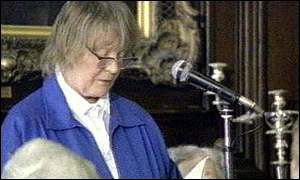
De Amerikaanse schrijver Richard Russo werd geboren op 15 juli 1949 in Johnstown, New York. Zie ook alle tags voor Richard Russo op dit blog.
Uit: That Old Cape Magic
„A Finer Place
Though
the digital clock on the bedside table in his hotel room read 5:17,
Jack Griffin, suddenly wide awake, knew he wouldn’t be able to get back
to sleep. He’d allowed himself to drift off too early the night before.
On the heels of wakefulness came an unpleasant realization, that what he
hadn’t wanted to admit yesterday, even to himself, was now all too
clear in the solitary, predawn dark. He should have swallowed his
petulance and waited the extra day for Joy.
It had been their long-
established habit to flee the campus as soon as Griffin taught his last
class. Usually, they hopped on the Freedom Trail (his term for I- 95),
drove to New York and treated themselves by checking into a good hotel.
During the day he would evaluate his small mountain of student
portfolios while Joy shopped or otherwise amused herself, and then,
evenings, they’d catch up on movies and go to good restaurants. The
whole thing reminded him of the early years of their marriage back in
L.A. It cost a small fortune, but there was something about spending
money they didn’t really have that made him optimistic about more coming
in—which was how it had worked in L.A.—and it got him through the
portfolios.
This year Kelsey’s Cape Cod wedding had royally screwed
up their plans, making New York impractical, though he’d been willing to
substitute Boston. But Joy, assuming that thanks to the wedding all the
usual bets were off, had messed things up further by scheduling
meetings on the day after his last class. “Just go,” she said when he
expressed his annoyance at the way things were working out. “Have a
boys’ night out in Boston and I’ll meet you on the Cape.” He’d squinted
at this proposal. Didn’t you need more than one to have a boys’ night
out? Or had Joy meant it to be singular, one boy celebrating his
boyness? Was that how she’d understood the phrase all her life, as
singular? Joy’s relationship to the English language was not without
glitches.“
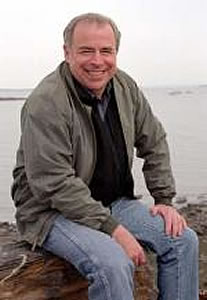
De Franse schrijver Jean Christophe Grangé werd geboren op 15 juli 1961 in Parijs. Zie ook alle tags voor Jean Christophe Grangé op dit blog.
Uit: La Forêt des Mânes
“C’etait ça. Exactement ça..
Les escarpins Prada repérés dans le Vogue du mois dernier. La note discrète, décisive, qui achèverait l’ensemble. Avec la robe qu’elle imaginait – un petit truc noir qu’elle avait acheté trois fois rien rue du Dragon –, ce serait parfait. Tout simplement dégaine. Sourire. Jeanne Korowa s’étira derrière son
bureau. Elle avait enfin trouvé sa tenue pour le soir.A` la fois dans la forme mais aussi dans l’esprit.
Elle vérifia encore une fois son portable. Pas de message. Une pointe d’angoisse lui crispa l’estomac. Plus aiguë, plus profonde encore que les précédentes. Pourquoi n’appelait-il pas ? Il était plus de 16 heures. N’était-il pas déjà trop tard pour confirmer un dîner ?
Elle balaya ses doutes et téléphona à la boutique Prada de l’avenue Montaigne. Avaient-ils les chaussures ? en 39 ? Elle serait là avant 19 heures. Bref soulagement. Aussitôt rattrapé par une autre
inquiétude. Déjà 800 euros de découvert sur son compte… Avec ce nouvel achat, elle passerait au-delà des 1 300 euros.
Mais on était le 29 mai. Son traitement lui serait versé dans deux jours. 4 000 euros. Pas un cent de plus, primes comprises. Elle allait donc attaquer son mois, encore une fois, avec un tiers de ses revenus amputés. Elle avait l’habitude. Depuis longtemps, elle pratiquait la claudication bancaire avec une certaine agilité.
Elle ferma les yeux. S’imagina juchée sur ses talons vernis. Ce soir, elle serait une autre. Méconnaissable. Flamboyante. Irrésistible. Le reste ne serait qu’un jeu d’enfant. Rapprochement. Réconciliation.
Nouveau départ…
Mais pourquoi n’appelait-il pas ? C’était pourtant lui qui avait repris contact la veille au soir. Pour la centième fois de la journée, elle ouvrit sa boîte aux lettres électronique et consulta l’e-mail.”
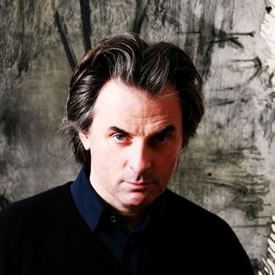
De Marokkaanse schrijver Driss Chraïbi werd geboren in El Jadida op 15 juli 1926. Zie ook alle tags voor Driss Chraïbi op dit blog.
Uit: L’Homme qui venait du passé
“ Les
beignets étaient chauds, gluants de miel de l’Atlas, aussi appétissants
que des monts de Vénus en pleine jouissance. Le thé vert était parfumé à
la “chiba”, cette absinthe sauvage inconnue des touristes. La journée
s’annonçait sous les meilleurs auspices. Avec un soupir d’aise,
l’inspecteur Ali déplia ses interminables jambes sous la table basse,
noua une serviette autour de son cou et déploya un journal qui datait de
quelques jours.
“De notre envoyé spécial à Washington. Le Congrès
vient de voter, à l’écrasante majorité de 346 voix contre 40 et peu
d’abstentions, une résolution demandant au Président George W. Bush de
décréter un jour de jeûne et de prières pour que la Providence divine
protège l’Amérique et les forces de la coalition engagées en Irak…”
…
Ami lecteur, ce livre que vous venez d’ouvrir aurait pu s’arrêter ici,
selon toutes les lois de la statistique, sinon de la tuyauterie la plus
élémentaire. Vous auriez peut-être été frustré – et moi plus encore.
Plus de héros, plus d’enquête ! Parce qu’à cet instant précis,
l’inspecteur Ali aurait dû logiquement mourir d’étouffement. Prenez un
beignet, fourrez-le de quelques olives dénoyautées (du sucré-salé en
quelque sorte), et essayez donc de l’avaler sans mâcher ou presque.
C’est possible, dites-vous ? D’accord ! Mais si dans le même temps, au
moment de déglutir, vous étiez pris d’un brusque accès d’hilarité ?…
C’est ce qui arriva ce matin-là à l’inspecteur. Ne me demandez pas
comment il resta encore en vie, sans assistance respiratoire, loin de
tout service de réanimation. Je puis cependant avancer une hypothèse qui
vaut ce qu’elle vaut : il fut sauvé par l’habitude – une sorte de long
entraînement pour les courses 400 mètres haies.”
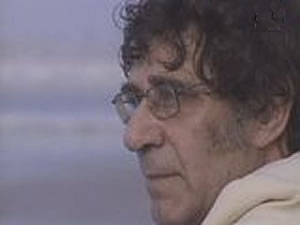
De Joods-Duitse schrijver en cultuurfilosoof Walter Benjamin werd geboren op 15 juli 1892 in Berlijn. Zie ook alle tags voor Walter Benjamin op dit blog.
Uit: Berliner Kindheit um Neunzehnhundert
„Die Weihnachtspyramide, Die Vorgängerin des Weihnachtsbaums
Die
älteste Anordnung der Weihnachtskerzen kam aus den Kirchenbräuchen: Das
war die Lichterpyramide; ein stabiles und steiles Holzgestellchen, an
dem die Kerzen sich in verschiedenen Schichten staffelten. Diesen
Pyramiden, so zierlich sie auch waren, fehlte freilich der Duft von Harz
und Tannennadeln.
Der Sieg des Weihnachtsbaums entschied sich langsam. Wie, das zeigen unsre Bilder, die alten Kinderbüchern entnommen sind.
Schließlich
war es ein kleiner Zwischenfall, der für die Dauer die Pyramide durch
den Weihnachtsbaum verdrängte. Es trug sich 1827 auf dem Berliner
Weihnachtsmarkte zu. Damals wurden Tannen- und Fichtenbäume auf den
Straßen nur sehr vereinzelt ausgeboten, Pyramiden dagegen fünfmal mehr
als Weihnachtsbäume. Arbeiter nämlich, die im Winter jenes Jahres keine
Beschäftigung gefunden hatten, waren auf die Idee verfallen,
Weihnachtspyramiden zu basteln und verkauften sie vorm Fest an allen
Ecken. Dadurch entstand ein solcher Überfluß, daß mehr als tausend
Pyramiden aller Größen unverkäuflich blieben, trotzdem man sie für einen
Silbergroschen ausschrie. Als keine Aussicht zu verkaufen mehr
vorhanden war, schleppten die Leute ihre eigene Ware nach der
Königsbrücke und schleuderten sie kopfüber auf die Eisdecke der Spree,
von wo am Weihnachtsmorgen dann die armen Leute sie als Brennstoff
holten. Von dieser “Krise” hat sich der Pyramidenmarkt nie mehr erholt.“
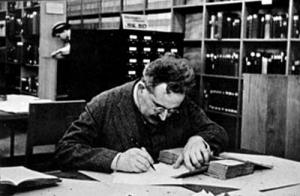
De Franse schrijver Jacques Rivière werd geboren op 15 juli 1886 in Bordeaux. Zie ook alle tags voor Jacques Rivière op dit blog.
Uit: Alain-Fournier
„Un
mot d’André Gide nous avait beaucoup frappés et travaillait depuis
quelque temps déjà notre esprit : « Ce n’est plus le moment d’écrire des
poèmes en prose », m’avait-il déclaré en me remettant un essai de
Fournier que je lui avais fait lire. Nous nous étions révoltés contre ce
décret dont la sévérité nous paraissait affreuse mais en même temps
nous avions réfléchi et le sens en avait pénétré profondément dans notre
double pensée et l’avait émue.
Nous distinguions maintenant, dans
cette partie de nous-mêmes qui s’éprouvait créatrice, ce que Gide avait
voulu dire : une impuissance, en effet, se trouvait correspondre en
nous au genre qu’il avait condamné, une impuissance qu’il nous fallait
bien à la fin reconnaître.
Le poème en prose, tel que le
Symbolisme nous l’avait enseigné, était devenu, par la simple faute des
années, un instrument entre nos mains complètement inefficace et ne
pouvait plus nous permettre aucune prise sur la sensibilité d’autrui. Il
avait quelque chose de trop tacite ; de tous les éléments qu’il
ordonnait à son auteur de sous-entendre sous peine de grossièreté, il ne
se pouvait pas qu’à la fin l’émotion du lecteur ne se trouvât pas
diminuée ; il dispensait de trop de choses pour qu’en le lisant on ne se
sentît pas dispensé aussi d’en être touché.
Et du même coup une
lumière éclatante jaillissait, qui nous montrait le chemin. Fournier
l’aperçut le premier et la suivit : il fallait rompre avec le Symbolisme
et avec tout l’arsenal trop « mental » qu’il proposait ; il fallait
sortir de l’esprit et du cœur, saisir les choses, les faits, les amener
entre le lecteur et l’émotion à laquelle on voulait le conduire : « Ce
qu’il y a de plus ancien, de presque oublié, d’inconnu à nous-mêmes, —
c’est de cela que j’avais voulu faire mon livre et c’était fou. C’était
la folie du Symbolisme. Aujourd’hui cela tient dans mon livre la même
place que dans ma vie : c’est une émotion défaillante, à un tournant de route, à un bout de paragraphe… »
Fournier
découvrait cette fois son aptitude et sa force véritables : il se
comprenait romancier. Il échappait d’un seul coup à la rêverie, à cette
vague intimité avec lui-même où il s’était si longtemps complu et dans
laquelle son manque de lucidité intérieure lui interdisait de faire des
progrès. Il replaçait la vie avec tous ses accidents devant ce songe
qu’il avait vainement essayé de modeler directement et il ne comptait
plus que sur des faits, que sur des gestes scrupuleusement décrits pour
faire entrevoir celui-ci à son lecteur, « à un tournant de route, à un
bout de paragraphe ».
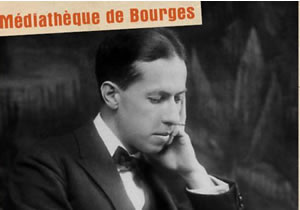
De Duitse dichter, schrijver, vertaler, essayist en uitgever Robert Wohlleben werd geboren op 15 juli 1937 in Rahlstedt. Zie ook alle tags voor Robert Wohlleben op dit blog en ook mijn blog van 15 juli 2010.
Gemäßigte Zone
Wie jeder Tropfen, jede Flocke fällt
– die Peitschenlampe leuchtets aus –
geht uns ins Auge: ganz scharf eingestellt.
Da flimmert, was den Blick vergällt:
Da schneit wer rein und regnet jemand raus.
Die Türen führen all vors Haus,
was hier sich schleicht, das wird vom Spitz verbellt,
dem ist die Welt schlicht Mann und Maus.
Im Tag kam Bildertreibsel mitgespült,
nun staut der Schwall sich im Quartier,
aus Plankton wird gemächlich Sediment.
Im Schlick von gestern hat sich eingewühlt,
was sich da heckt als Muschelzeug und Pier,
was Zeit nur als Detritus kennt.
Soundsovieltes Liebesgedicht
Hier neigen Härchen unterm Griff sich so,
und hier ist krause Haut für die Papillen,
die Fingerspitze kennt den Weg durch Rillen
zum Mund, zum Bauch, zum Widerrist, zum Po.
Die Nase buchstabiert sich ihr Argot
von A wie Achsel bis … das wird mich killen!
Der Schweiß verkehrt vom stillen sich zum schrillen,
und alle Brünnlein strömen lichterloh!
Und Absturz: Blick verfing sich stracks im Blick,
daß deckungsgleich sich Lieb und Liebe nichten –
so logisch läuft und linkt sich das Programm.
Der Trick vom ersten bis zum letzten Fick:
ein Sediment aus Strömung von Gesichten …
sehr schlicht gerieft verschlacken Schlick und Schlamm.
für Ralf Thenior
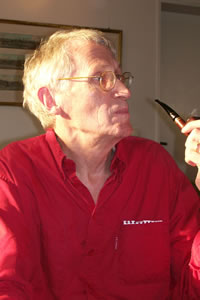
De Duitse dichter en schrijver Heinrich Peuckmann werd geboren op 15 juli 1949 in Kamen. Zie ook alle tags voor Heinrich Peuckmann op dit blog en ook mijn blog van 15 juli 2010.
Uit: Schillers Vermächtnis
„Er atmete auf. Aber gerade, als er seinen Weg fortsetzen wollte, als er den ersten Schritt dazu tat, ertönte ein Knall aus der Dunkelheit, kurz und trocken. Gleichzeitig spürte er einen stechenden Schmerz im rechten Oberschenkel. Er brauchte einen Augenblick, um zu begreifen, dass Knall und Schmerz im Zusammenhang standen. Richtig klar wurde es ihm aber erst, als er nach seinem Bein griff und die warme Flüssigkeit spürte, die an der Hose herunter lief. Zu groß war die Überraschung gewesen, obwohl sein Instinkt ihn gewarnt hatte. Erst als er das Blut in seiner Hand sah, als er merkte, wie es von dort auf den Boden tropfte, verstand er, in welcher Situation er sich befand.
Er wollte weglaufen, so schnell wie möglich, aber er schaffte es nicht. So sehr er sich auch anstrengte, er war unfähig, auch nur einen Schritt zu tun. Da wusste er, dass er jemandem, der es auf ihn abgesehen hatte, wehrlos ausgeliefert war. Dass er ein ungeschütztes, leicht zu treffendes Ziel abgab.
Ein, zwei Sekunden, die ihm endlos lange vorkamen, stand er gebückt da, die rechte Hand auf den blutenden Oberschenkel gedrückt und mit pochendem Herzen darauf wartend, dass ein zweiter Knall ertönte. Ein Knall, den er vielleicht noch hören, aber nicht mehr spüren würde. Der ihn umreißen und sein Denken auslöschen würde. Für immer. Aber er ertönte nicht, dieser Knall. So sehr er auch lauschte, die Dunkelheit vor ihm blieb schwarz und still.“
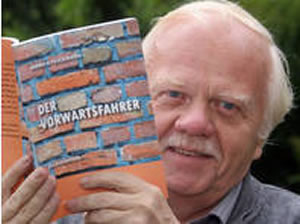
De Amerikaanse schrijver Clive Cussler werd geboren in Aurora, Illinois op 15 juli 1931. Zie voor ook alle tags voor Clive Cussler op dit blog en ook mijn blog van 15 juli 2010.
Uit: Valhalla Rising
„They
moved through the morning mist like ghosts, silent and eerie in phantom
ships. Tall, serpentine prows arched gracefully on bow and stern,
crowned with intricately carved dragons, teeth bared menacingly in a
growl as if their eyes were piercing the vapor in search of victims.
Meant to incite fear into the crew’s enemies, the dragons were also
believed to be protection against the evil spirits that lived in the
sea.
The little band of immigrants had come across a hostile sea in
long, elegantly shaped black hulls that skimmed the waves with the ease
and stability of trout in a peaceful brook. Long oars reached from holes
in the hulls and dipped into the dark water, pulling the ships through
the waves. Their square red-and-white striped sails hung limp in the
listless air. Small lapstrake boats twenty feet long and carrying extra
cargo were tied to the sterns and towed behind.
These people were
the precursors of those who would come much later: men, women and
children, along with their meager possessions, including livestock. Of
the paths Norsemen had blazed across the oceans, none was more dangerous
than the great voyage across the North Atlantic. Despite the perils of
the unknown, they’d boldly sailed through the ice floes, struggled under
the gale-force winds, fought monstrous waves and endured vicious storms
that surged out of the southwest. Most had survived, but the sea had
exacted its cost. Two of the eight ships that had set out from Norway
were lost and never seen again.“
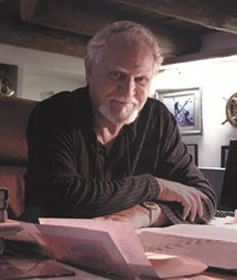
De Franse literair criticus en filosoof Jacques Derrida werd geboren in El-Biar, Algerije, op 15 juli 1930. Zie ook alle tags voor Jacques Derrida op dit blog en ook mijn blog van 15 juli 2010.
Uit: Violence et Métaphysique
„Cette différence est mieux pensée aujourd’hui. Qu’elle vienne au jour et soit pensée comme telle, c’est sans doute le trait le plus inapparent à l’historien des faits, des techniques ou des idées, le plus inessentiel à ses yeux. Mais c’est peut-être, compris avec toutes ses implications, le caractère le plus profondément inscrit de notre époque. Mieux penser cette différence, ne serait-ce pas en particulier savoir que si quelque chose doit encore advenir à partir de la tradition dans laquelle les philosophes se savent toujours surpris, ce sera à condition d’en requérir sans cesse l’origine et de faire rigoureusement effort pour se tenir au plus proche d’elle-même. Ce qui n’est pas balbutier et se blottir paresseusement au creux de l’enfance. Mais précisément le contraire.»
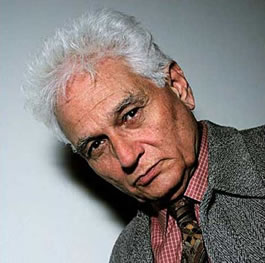
De Britse schrijver Hammond Innes werd op 15 juli 1913 in Horsham geboren als zoon van een bankdirecteur. Zie ook alle tags voor Hammond Innes op dit blog en ook mijn blog van 15 juli 2010.
Uit: Maddon’s Rock
“I have always had a tendency to claustrophobia – a dread of being alone in small, enclosed spaces and a morbid curiosity in any cave or shaft that took me into the bowels of the earth. The result was that I was happiest sweating my guts out in that damned quarry which had provided the stone to build the prison or laboring on the prison farm. I didn’t mind the cleaning, the discipline, the work – so long as I was in the company of other human beings. Even now I cannot read the accounts of men who suffered solitary confinement in German concentration camps without feeling panic seizing at me. I think if that had happened to me I should have gone mad. But as long as I had plenty of hard work during the day and a book to read at night, I managed to stave off the feeling of loneliness that I dreaded more than anything else.”
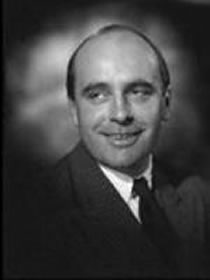
De Japanse dichter en schrijver Kunikida Doppo werd geboren op 15 juli 1871 in Choshi. Zie ook alle tags voor Kunikida Doppo op dit blog.
Uit: Byosho roku
„I have never troubled myself over stylistic matters, as form is not my object in writing. I am simply concerned with how to express the thoughts that fill my breast. And so I have written some of my stories … in an epistolary style, others … in a quasi-lecture style, and still others … in diary form or …
a hybrid of fiction and essay. I am not interested in the merits or demerits of a particular style. I seek only to convey my own true voice…. To take up your pen out of a desire to produce fine writing is to ignore your own true feelings and make it impossible to move others. Only by putting down precisely what you feel and expressing your thoughts frankly and without deception or decoration, no matter how awkward the attempt, can you create a genuine and appealing work of literature…. The task is simple: give vent to your emotions. If you do, then one work in ten at least is sure to be true literature.“
